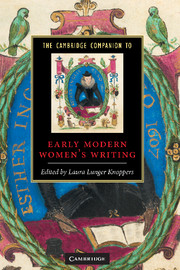Book contents
14 - Lyric poetry
from Part III - Genres and modes
Published online by Cambridge University Press: 28 July 2010
Summary
Near the beginning of the seventeenth century, a gentlewoman married a 'yonge Gent who after forsooke', and in the aftermath of his desertion she 'tooke hir needle in wch she was excelent and worked upon hir Sampler thus': “Come give me needle stitchcloth silke and haire, That I may sitt and sigh and sow and singe, For perfect collours to discribe the aire A subtile persinge changinge constant thinge. / No false stitch will I make my hart is true, Plaine stitche my sampler is for to complaine Now men have tongues of hony, harts of rue, True tongues and harts are one, Men makes them twain. / Give me black silk that sable suites my hart And yet som white though white words do deceive No greene at all for youth and I must part, Purple and blew, fast love and faith to weave. Mayden no more sleepeless ile go to bedd Take all away, the work works in my hedd.” / This early modern lyric poem weaves together many strands (as it were) of the characteristic construction of female experience: the speaker's identity as a 'mayden' or not; her abandonment by a honey-tongued man; the appeal to emotional constancy; her skill in needlework with, symbolically, 'no false stitch'; witty resilience in the face of misfortune; morbid self-absorption; and worldly wisdom even as she appears to abandon the world.
- Type
- Chapter
- Information
- The Cambridge Companion to Early Modern Women's Writing , pp. 208 - 221Publisher: Cambridge University PressPrint publication year: 2009
- 1
- Cited by



